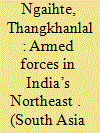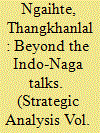| Srl | Item |
| 1 |
ID:
141777


|
|
|
|
|
| Summary/Abstract |
More than 60 years of de facto military rule through the Armed Forces (Special Powers) Act (AFSPA) 1958 in India’s northeast has engendered neither stability nor peace. Problems regarding the impunity of violence and crime, official corruption and the virtual collapse of the rule of law continue, but the Act remains in operation. This article attempts to reframe the debates on the AFSPA in terms of its necessity by turning the necessity argument on its head and arguing that the secessionist insurgencies which were originally used to justify the Act have actually long ceased to exist. Since the principle of existential necessity that provided a fig leaf to the Act no longer applies, its continued application needs to be re-examined. It is further argued that the Indian military’s increasing clout in internal security policy-making may have grave implications for Indian democracy itself, with negative impacts on the rule of law and in relation to safe inclusion strategies for India’s northeast.
|
|
|
|
|
|
|
|
|
|
|
|
|
|
|
|
| 2 |
ID:
127466


|
|
|
|
|
| Publication |
2014.
|
| Summary/Abstract |
More than 16 years have passed since the government and the National Socialist Council of Nagalim (Isak-Muivah faction, or NSCN(IM))1 initiated peace talks that have come to be known as the Indo-Naga peace process.2 More than 70 rounds of talks were said to have been held during the period 1997-2012. If the Naga insurgency dating from 1954 is the longest-lived insurgency in the world today,3 the 16-year-long peace process is also equally unprecedented. The talks were based on three procedural principles: that they be conducted without pre-conditions; that they be conducted at the highest, prime ministerial level; and that they be held outside India. These 'rites of negotiation' carry more than symbolic value. As Samir Kumar Das observed, 'It is perhaps the first time in history when the Constitution as an original document was no longer considered the beginning with a view to make a new beginning'.4
Despite the lofty rhetoric, the talks soon unravelled. By and large, the core agenda evolved from the original Naga demand of sovereign statehood to integration of Naga-dominated areas in India, and now to some form of non-territorial integration model. Despite these compromises and climb-downs on the part of the Nagas, and despite a broad political consensus in India in favour of a negotiated solution, resolution of the Naga problem seems as remote now as it was in 1997, when the present peace process started.
|
|
|
|
|
|
|
|
|
|
|
|
|
|
|
|